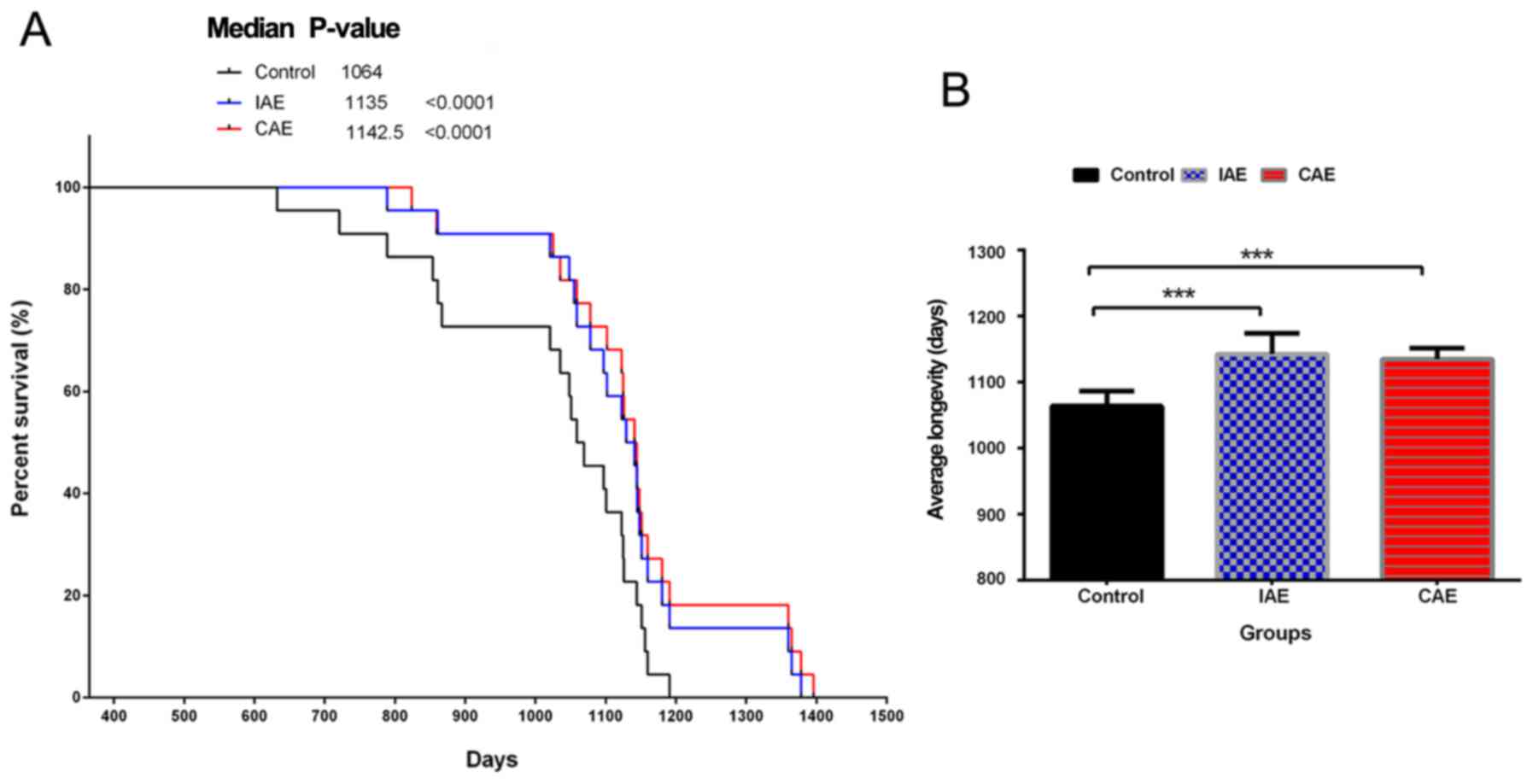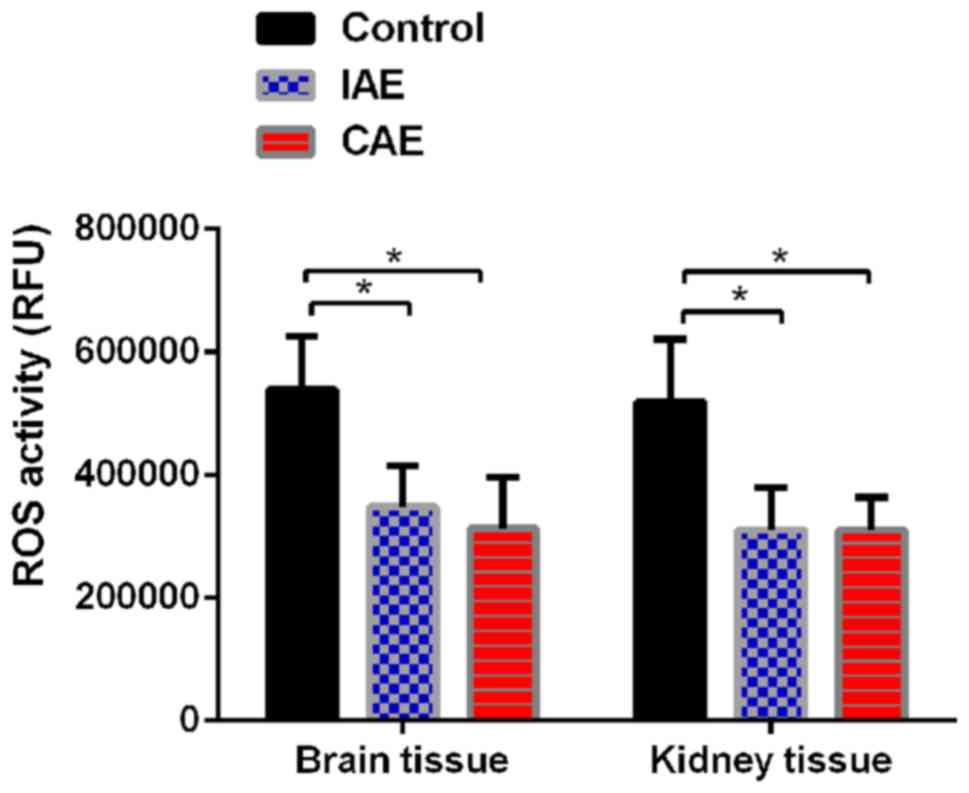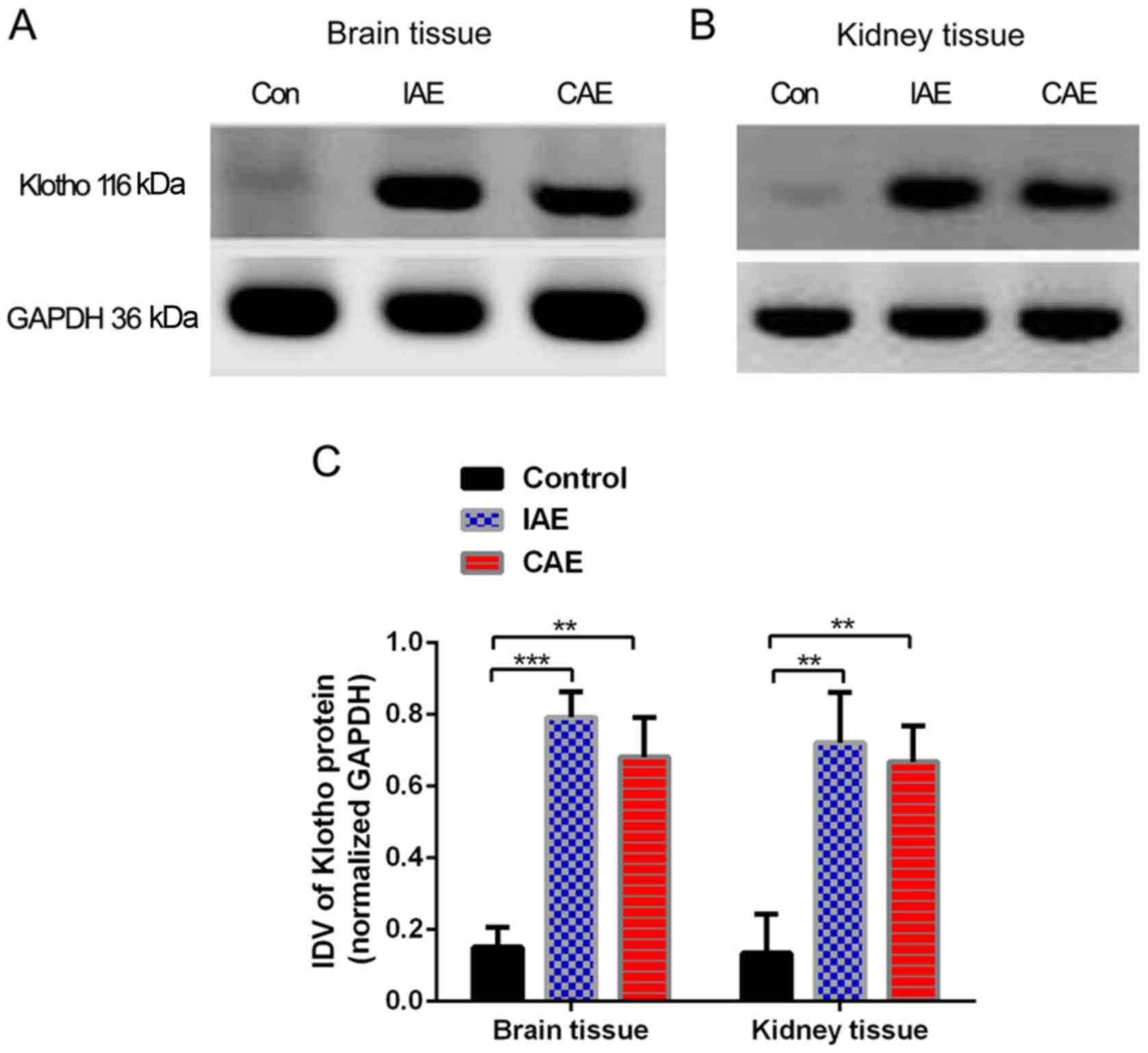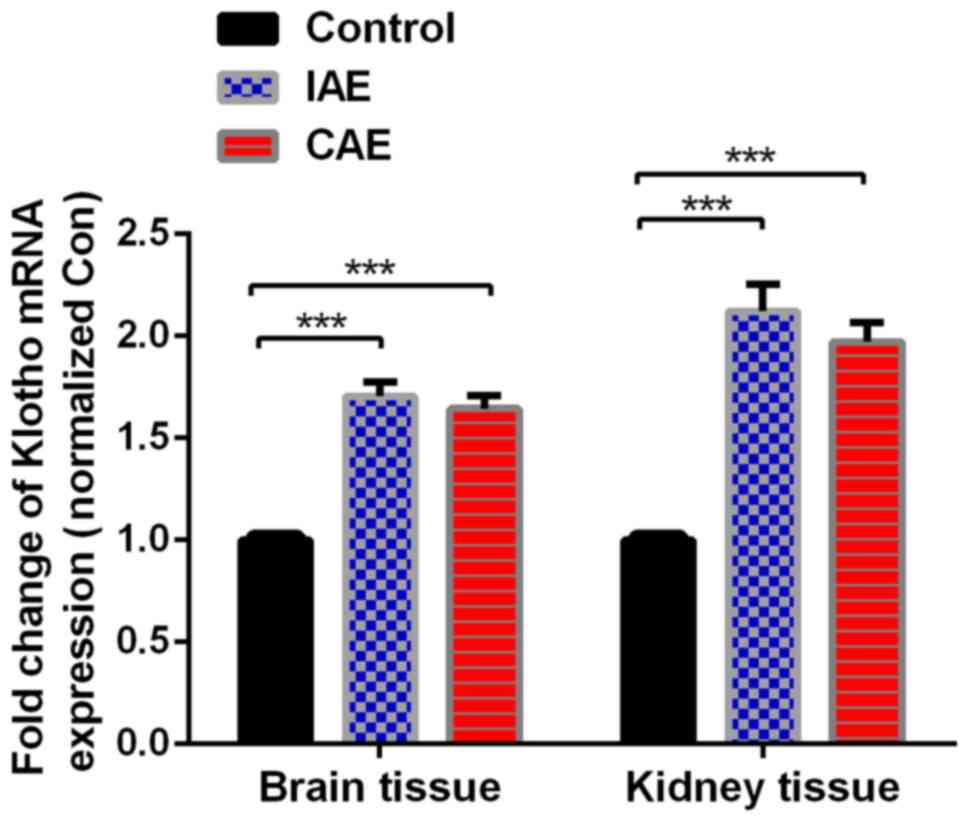|
1
|
Garatachea N, Pareja-Galeano H,
Sanchis-Gomar F, Santos-Lozano A, Fiuza-Luces C, Morán M, Emanuele
E, Joyner MJ and Lucia A: Exercise attenuates the major hallmarks
of aging. Rejuvenation Res. 18:57–89. 2015. View Article : Google Scholar : PubMed/NCBI
|
|
2
|
Seals DR: Edward F. Adolph distinguished
lecture: The remarkable anti-aging effects of aerobic exercise on
systemic arteries. J Appl Physiol (1985). 117:425–439. 2014.
View Article : Google Scholar : PubMed/NCBI
|
|
3
|
Jadczak AD, Makwana N, Luscombe-Marsh N,
Visvanathan R and Schultz TJ: Effectiveness of exercise
interventions on physical function in community-dwelling frail
older people: An umbrella review of systematic reviews. JBI
Database Syst Rev Implement Rep. 16:752–775. 2018. View Article : Google Scholar
|
|
4
|
Matos N and Winsley RJ: Trainability of
young athletes and overtraining. J Sports Sci Med. 6:353–367.
2007.PubMed/NCBI
|
|
5
|
Kuro-o M, Matsumura Y, Aizawa H, Kawaguchi
H, Suga T, Utsugi T, Ohyama Y, Kurabayashi M, Kaname T, Kume E, et
al: Mutation of the mouse klotho gene leads to a syndrome
resembling ageing. Nature. 390:45–51. 1997. View Article : Google Scholar : PubMed/NCBI
|
|
6
|
Hu MC, Shi M, Zhang J, Quiñones H,
Griffith C, Kuro-o M and Moe OW: Klotho deficiency causes vascular
calcification in chronic kidney disease. J Am Soc Nephrol.
22:124–136. 2011. View Article : Google Scholar : PubMed/NCBI
|
|
7
|
Imura A, Iwano A, Tohyama O, Tsuji Y,
Nozaki K, Hashimoto N, Fujimori T and Nabeshima Y: Secreted Klotho
protein in sera and CSF: Implication for post-translational
cleavage in release of Klotho protein from cell membrane. FEBS
Lett. 565:143–147. 2004. View Article : Google Scholar : PubMed/NCBI
|
|
8
|
Mencke R and Hillebrands JL; NIGRAM
consortium, : The role of the anti-ageing protein klotho in
vascular physiology and pathophysiology. Ageing Res Rev.
35:124–146. 2017. View Article : Google Scholar : PubMed/NCBI
|
|
9
|
Zuo Z, Lei H, Wang X, Wang Y, Sonntag W
and Sun Z: Aging-related kidney damage is associated with a
decrease in klotho expression and an increase in superoxide
production. Age (Dordr). 33:261–274. 2011. View Article : Google Scholar : PubMed/NCBI
|
|
10
|
Kim JH, Hwang KH, Park KS, Kong ID and Cha
SK: Biological role of anti-aging protein klotho. J Lifestyle Med.
5:1–6. 2015. View Article : Google Scholar : PubMed/NCBI
|
|
11
|
Pako J, Barta I, Balogh Z, Kerti M,
Drozdovszky O, Bikov A, Antus B, Horvath I and Varga J: Assessment
of the anti-aging klotho protein in patients with COPD undergoing
pulmonary rehabilitation. COPD. 14:176–180. 2017. View Article : Google Scholar : PubMed/NCBI
|
|
12
|
Baluchnejadmojarad T, Eftekhari SM,
Jamali-Raeufy N, Haghani S, Zeinali H and Roghani M: The anti-aging
protein klotho alleviates injury of nigrostriatal dopaminergic
pathway in 6-hydroxydopamine rat model of Parkinson's disease:
Involvement of PKA/CaMKII/CREB signaling. Exp Gerontol. 100:70–76.
2017. View Article : Google Scholar : PubMed/NCBI
|
|
13
|
Hsieh CC, Kuro-o M, Rosenblatt KP, Brobey
R and Papaconstantinou J: The ASK1-Signalosome regulates p38 MAPK
activity in response to levels of endogenous oxidative stress in
the klotho mouse models of aging. Aging (Albany NY). 2:597–611.
2010. View Article : Google Scholar : PubMed/NCBI
|
|
14
|
Wang Y, Wang S, Wier WG, Zhang Q, Jiang H,
Li Q, Chen S, Tian Z, Li Y, Yu X, et al: Exercise improves the
dilatation function of mesenteric arteries in postmyocardial
infarction rats via a PI3K/Akt/eNOS pathway-mediated mechanism. Am
J Physiol Heart Circ Physiol. 299:H2097–H2106. 2010. View Article : Google Scholar : PubMed/NCBI
|
|
15
|
Karvinen SM, Silvennoinen M, Ma H,
Törmäkangas T, Rantalainen T, Rinnankoski-Tuikka R, Lensu S, Koch
LG, Britton SL and Kainulainen H: Voluntary running Aids to
maintain high body temperature in rats bred for high aerobic
capacity. Front Physiol. 7:3112016. View Article : Google Scholar : PubMed/NCBI
|
|
16
|
Calabrese EJ: Pre- and post-conditioning
hormesis in elderly mice, rats, and humans: Its loss and
restoration. Biogerontology. 17:681–702. 2016. View Article : Google Scholar : PubMed/NCBI
|
|
17
|
Wisløff U, Støylen A, Loennechen JP,
Bruvold M, Rognmo Ø, Haram PM, Tjønna AE, Helgerud J, Slørdahl SA,
Lee SJ, et al: Superior cardiovascular effect of aerobic interval
training versus moderate continuous training in heart failure
patients: A randomized study. Circulation. 115:3086–3094. 2007.
View Article : Google Scholar : PubMed/NCBI
|
|
18
|
Colcombe SJ, Erickson KI, Scalf PE, Kim
JS, Prakash R, McAuley E, Elavsky S, Marquez DX, Hu L and Kramer
AF: Aerobic exercise training increases brain volume in aging
humans. J Gerontol A Biol Sci Med Sci. 61:1166–1170. 2006.
View Article : Google Scholar : PubMed/NCBI
|
|
19
|
Jonasson LS, Nyberg L, Kramer AF,
Lundquist A, Riklund K and Boraxbekk CJ: Aerobic exercise
intervention, cognitive performance, and brain structure: Results
from the physical influences on brain in aging (PHIBRA) study.
Front Aging Neurosci. 8:3362017. View Article : Google Scholar : PubMed/NCBI
|
|
20
|
Eren M, Boe AE, Murphy SB, Place AT,
Nagpal V, Morales-Nebreda L, Urich D, Quaggin SE, Budinger GR,
Mutlu GM, et al: PAI-1-regulated extracellular proteolysis governs
senescence and survival in Klotho mice. Proc Natl Acad Sci USA.
111:7090–7095. 2014. View Article : Google Scholar : PubMed/NCBI
|
|
21
|
Deng G and Liu D: Klotho: A promising
biomarker closely related to kidney transplant. Exp Clin
Transplant. 16:253–258. 2018.PubMed/NCBI
|
|
22
|
Boksha IS, Prokhorova TA, Savushkina OK
and Tereshkina EB: Klotho protein: Its role in aging and central
nervous system pathology. Biochemistry (Mosc). 82:990–1005. 2017.
View Article : Google Scholar : PubMed/NCBI
|
|
23
|
Kooman JP, Dekker MJ, Usvyat LA, Kotanko
P, van der Sande FM, Schalkwijk CG, Shiels PG and Stenvinkel P:
Inflammation and premature aging in advanced chronic kidney
disease. Am J Physiol Renal Physiol. 313:F938–F950. 2017.
View Article : Google Scholar : PubMed/NCBI
|
|
24
|
Teocchi MA, Ferreira AÉ, da Luz de
Oliveira EP, Tedeschi H and D'Souza-Li L: Hippocampal gene
expression dysregulation of klotho, nuclear factor kappa B and
tumor necrosis factor in temporal lobe epilepsy patients. J
Neuroinflammation. 10:532013. View Article : Google Scholar : PubMed/NCBI
|
|
25
|
Mecocci P, Boccardi V, Cecchetti R,
Bastiani P, Scamosci M, Ruggiero C and Baroni M: A long journey
into aging, brain aging, and Alzheimer's disease following the
oxidative stress tracks. J Alzheimers Dis. 62:1319–1335. 2018.
View Article : Google Scholar : PubMed/NCBI
|
|
26
|
Dubal DB, Zhu L, Sanchez PE, Worden K,
Broestl L, Johnson E, Ho K, Yu GQ, Kim D, Betourne A, et al: Life
extension factor klotho prevents mortality and enhances cognition
in hAPP transgenic mice. J Neurosci. 35:2358–2371. 2015. View Article : Google Scholar : PubMed/NCBI
|
|
27
|
Zeldich E, Chen CD, Colvin TA,
Bove-Fenderson EA, Liang J, Tucker Zhou TB, Harris DA and Abraham
CR: The neuroprotective effect of Klotho is mediated via regulation
of members of the redox system. J Biol Chem. 289:24700–24715. 2014.
View Article : Google Scholar : PubMed/NCBI
|
|
28
|
Chen CD, Zeldich E, Li Y, Yuste A and
Abraham CR: Activation of the anti-aging and cognition-enhancing
gene klotho by CRISPR-dCas9 transcriptional effector complex. J Mol
Neurosci. 64:175–184. 2018. View Article : Google Scholar : PubMed/NCBI
|
|
29
|
Zhou HJ, Zeng CY, Yang TT, Long FY, Kuang
X and Du JR: Lentivirus-mediated klotho up-regulation improves
aging-related memory deficits and oxidative stress in
senescence-accelerated mouse prone-8 mice. Life Sci. 200:56–62.
2018. View Article : Google Scholar : PubMed/NCBI
|
|
30
|
Ung L, Pattamatta U, Carnt N,
Wilkinson-Berka JL, Liew G and White AJR: Oxidative stress and
reactive oxygen species: A review of their role in ocular disease.
Clin Sci (Lond). 131:2865–2883. 2017. View Article : Google Scholar : PubMed/NCBI
|
|
31
|
Zhu H, Gao Y, Zhu S, Cui Q and Du J:
Klotho improves cardiac function by suppressing reactive oxygen
species (ROS) mediated apoptosis by modulating Mapks/Nrf2 signaling
in doxorubicin-induced cardiotoxicity. Med Sci Monit. 23:5283–5293.
2017. View Article : Google Scholar : PubMed/NCBI
|
|
32
|
Guo Y, Zhuang X, Huang Z, Zou J, Yang D,
Hu X, Du Z, Wang L and Liao X: Klotho protects the heart from
hyperglycemia-induced injury by inactivating ROS and NF-κB-mediated
inflammation both in vitro and in vivo. Biochim biophys acta.
1864:238–251. 2018. View Article : Google Scholar : PubMed/NCBI
|
|
33
|
Li DJ, Fu H, Zhao T, Ni M and Shen FM:
Exercise-stimulated FGF23 promotes exercise performance via
controlling the excess reactive oxygen species production and
enhancing mitochondrial function in skeletal muscle. Metabolism.
65:747–756. 2016. View Article : Google Scholar : PubMed/NCBI
|
|
34
|
Skulachev MV and Skulachev VP: Programmed
aging of mammals: Proof of concept and prospects of biochemical
approaches for anti-aging therapy. Biochemistry (Mosc).
82:1403–1422. 2017. View Article : Google Scholar : PubMed/NCBI
|
|
35
|
Matsumura Y, Aizawa H, Shiraki-Iida T,
Nagai R, Kuro-o M and Nabeshima Y: Identification of the human
klotho gene and its two transcripts encoding membrane and secreted
klotho protein. Biochem Biophys Res Commun. 242:626–630. 1998.
View Article : Google Scholar : PubMed/NCBI
|
|
36
|
Shiraki-Iida T, Aizawa H, Matsumura Y,
Sekine S, Iida A, Anazawa H, Nagai R, Kuro-o M and Nabeshima Y:
Structure of the mouse klotho gene and its two transcripts encoding
membrane and secreted protein. FEBS Lett. 424:6–10. 1998.
View Article : Google Scholar : PubMed/NCBI
|
|
37
|
Ohyama Y, Kurabayashi M, Masuda H,
Nakamura T, Aihara Y, Kaname T, Suga T, Arai M, Aizawa H, Matsumura
Y, et al: Molecular cloning of rat klotho cDNA: Markedly decreased
expression of klotho by acute inflammatory stress. Biochem Biophys
Res Commun. 251:920–925. 1998. View Article : Google Scholar : PubMed/NCBI
|
|
38
|
Haykowsky M, Scott J, Esch B, Schopflocher
D, Myers J, Paterson I, Warburton D, Jones L and Clark AM: A
meta-analysis of the effects of exercise training on left
ventricular remodeling following myocardial infarction: Start early
and go longer for greatest exercise benefits on remodeling. Trials.
12:922011. View Article : Google Scholar : PubMed/NCBI
|
|
39
|
Kraljevic J, Marinovic J, Pravdic D, Zubin
P, Dujic Z, Wisloff U and Ljubkovic M: Aerobic interval training
attenuates remodelling and mitochondrial dysfunction in the
post-infarction failing rat heart. Cardiovasc Res. 99:55–64. 2013.
View Article : Google Scholar : PubMed/NCBI
|


















